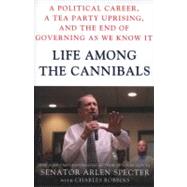
What is included with this book?
SENATOR ARLEN SPECTER, son of Jewish immigrants, grew up in Kansas, graduated Phi Beta Kappa from the University of Pennsylvania, served as an editor of the law journal at the Yale Law School, and was a lieutenant in the U.S. Air Force. As an Assistant Counsel to the Warren Commission investigating the assassination of President Kennedy, he developed the Single Bullet Theory. As Philadelphia District Attorney, he created a national model for the modern prosecutor’s office, sought life sentences for career criminals and realistic rehabilitation for first offenders, and trail-blazed prosecutions for police brutality. During thirty years in the U.S. Senate, he served as chairman of the Judiciary Committee, the Intelligence Committee, the Veterans’ Affairs Committee, and the Appropriations Subcommittee on Labor, Health and Human Services, and Education. He presided over the confirmation hearings of Chief Justice Roberts and Justice Alito, and his questioning of Judge Robert Bork, by many accounts, prompted the Senate to reject Bork’s nomination. He led successful efforts to triple funding for the National Institutes of Health. In 2007, Time magazine named him one of the Ten-Best Senators. He currently practices law in Philadelphia, lectures at the University of Pennsylvania Law School, and recently hosted a pilot of PBS’s Arlen Specter’s The Whole Truth, a public-affairs television program that cuts to the heart of the day’s toughest national political issues.
CHARLES ROBBINS served as Senator Specter’s communications director in his Senate office and on his presidential campaign. He is the author of the forthcoming novel The Accomplice as well as coauthor, with former Senate Majority Leader Tom Daschle, of the forthcoming The U.S. Senate, and coauthor of Senator Specter’s Passion for Truth. A former newspaper reporter and Navy reserve officer, he is a graduate of Princeton University, the Columbia University Graduate School of Journalism, and the master of fine arts program at Queens University of Charlotte. He lives in Washington, D.C.
Praise for Life Among the Cannibals
"Specter ... offers his knowledgeable, withering critique of brutal partisanship in national politics."
--Publishers Weekly
Praise for Never Give In
“Written in Senator Specter's trademark candor, Never Give In is a compelling tale of survival---both personal and political---from one of the Senate’s most independent voices.”
--Vice President Joe Biden
“Never Give In brims with the singular tenacity and humor that have characterized Arlen Specter’s nearly thirty years in the United States Senate. This book is both an entertaining read and an unflinching account of the experience of fighting an intensely personal battle on a highly public stage.”
--Michael J. Fox
“He knows a thing or two about illness and politics. It's a hell of a read.”
--Larry King
The New copy of this book will include any supplemental materials advertised. Please check the title of the book to determine if it should include any access cards, study guides, lab manuals, CDs, etc.
The Used, Rental and eBook copies of this book are not guaranteed to include any supplemental materials. Typically, only the book itself is included. This is true even if the title states it includes any access cards, study guides, lab manuals, CDs, etc.